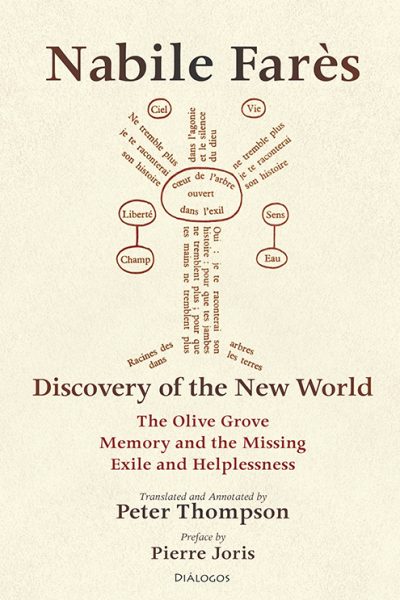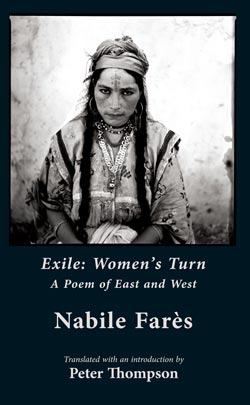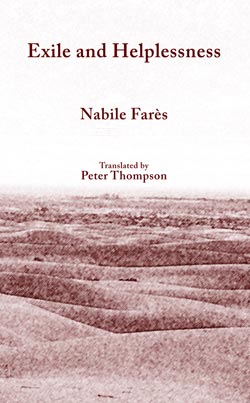Nabile Farès
 Nabile Farès was a Kabyle, a Berber, and one who spoke Berber before he spoke Arabic or French—one who wrote throughout his life about Kabylia and its Berber stronghold. In fact his doctoral thesis centered on the figure of the Ogress in Berber folklore. It is worth noting that Kabylia is one part of Algeria never fully subdued by Arab or French invaders.
Nabile Farès was a Kabyle, a Berber, and one who spoke Berber before he spoke Arabic or French—one who wrote throughout his life about Kabylia and its Berber stronghold. In fact his doctoral thesis centered on the figure of the Ogress in Berber folklore. It is worth noting that Kabylia is one part of Algeria never fully subdued by Arab or French invaders.
This ethnologist, philosopher, dramaturge, poet, novelist and psychoanalyst was born in Collo (Kabylia peninsula) in 1940. Thus he was a teenager at the time of the student demonstrations and the reciprocal massacres (French forces and settlers versus the Algerians) which began the Algerian War (the war of independence, 1954-62).
Farès’s father, Abderrahmane Farès (an administrator who became head of the provisional government after independence) sent him to France to study—and to be safe. Towards the end of the war, Nabile was one of the few Algerian students in Paris to choose to return to the struggle. He was on the east side of the Tunisian border—where FLN (National Liberation Front and their army) camps operated—when the war ended. A rich footnote to this era is that Farès carried the manuscript of Yahia, Pas de chance, his first novel, through France and North Africa in his back pack. Yahia was published in 1970.
Many Algerian writers saw the next years—eventually spanning decades—as a disappointment, then a betrayal. The victorious FLN became a one-party government, and a repressive one at that. The silencing of voices, an “Arabization” policy (Berbers are not Arabs), the discouragement of the French language, corruption, cronyism, authoritative Islam, and the receding of traditional (Berber) feminine roles are among the exactions that drove Mohammed Dib, Assia Djebar, Rachid Boudjedra, Farès and Kateb Yacine—among others—into exile. Worst was a collusion with neocolonial business interests (sharply outlined in Farès’s Un Passager de L’Occident, translated as A Passenger From the West), and, as a dark corner within the arch of this French shadow, the adoption of French torture techniques against insurgents. All this kept most writers—some of whom, like Farès, could no longer publish in Algeria—in France. Most of this group died in the exile that became an indelible mark of their work (particularly Farès’s novels and poetry). Farès died in Paris in August, 2016—recently married, having taught in Grenoble, founded a theater in Aix, received the Kateb Yacine Prize for lifetime achievement (1994), and provided psychoanalysis for years—often helping immigrants with their trauma.
During his student years he switched his “second” language (a diploma requirement, and really the third, after Berber and French) from Arabic to English. This is significant in two ways. First, it perhaps asserted the resentment many Berbers feel about the Arab invasions and dominance in North Africa. Secondly, novels in English—specifically American ones—were an element in his artistic development. [We add, here, that Farès’s English ability made him a lively and involved partner in the translation of his work.] Erskine Caldwell and Faulkner were especially influential. This influence was also felt by Farès’s contemporaries, including the (somewhat earlier) foundational group of Djebar, Dib, Kateb, Mouloud Feraoun and Mouloud Mammeri. Emmanuel Levinas, whom Farès met in his student years, was important to him, as was the novelist Witold Gombrowicz.
Another influence was the Moroccan, Abdelkébir Khatibi, Farès’s contemporary and a friend. Khatibi’s experiment with his “bi-langue,” a permanent tension between languages (as a result of colonialism) was the model for a creative, non-dogmatic, ontological sense of possibilities for the writer in the postcolonial age. What Farès did with this shows less tension in every line (in the novels), but adopts a similar sense of fragmentation in both poetic image and plot: a personal identity in flux, a language and identity always self-defining in terms of an Other, yet not an identity in crisis or political revolt. The constant influence of the Other is the alterity (“altérité”) central to many studies of Farès, including Mohammed-Saâd Zemmouri’s extended work, La Dialectique de l’identité and his article “La Passsion de l’altérité chez l’écrivain Nabile Farès.” As a literary preoccupation it also derives from phenomenology, from Heidegger, Merleau-Ponty and Sartre, and from their influence on many writers of the 1950s and 1960s, including the French Nouveau Roman (New Novel) group. In the latter group Claude Ollier made a profound impression on Farès. His La Mise en scène is set in Morocco, and his Le Maintien de l’ordre has a nameless setting but is based on French repression in Algeria.
As with much of modern poetry—as with the Hegelian dialectic that the Surrealists invoked in their definition of poetic image—Farès developed (in his protagonists) a dialectical approach to identity. Beyond that, and before examining it further, we note that he “deterritorialized” his protagonists, in the Deleuzian sense (Yahia, A Passenger From the West, L’Exil et le désarroi—the latter translated as Exile and Helplessness). Their complex identities evolve as a function (with positive and creative quantities in the mix) of separation from homeland and mother tongue. The “New World” in his trilogy La Découverte du nouveau monde, and James Baldwin’s coming to Paris “from the West” (Passenger), structurally serve this purpose in the novels. With the topic of exile so prominent, it is remarkable—and constantly rewarding for the reader—that we learn so much in addition about Algeria and its history (Le Champ des Oliviers, Exile and Helplessness).
The complex issues of identity in the modern world—but also in the exile of the postcolonial context—have been given special emphasis by Deleuze and Guattari (in Mille Plateaux, A Thousand Plateaus). Their sense of identity (an exiled Algerian would be an example) as a “minoritarian” identity, as a project of becoming, is a broad avenue for understanding Farès’s poetry (particularly Escuchando tu historia, translated as Hearing Your Story, and L’Exil au féminin, translated as Exile: Women’s Turn), along with the characters in the novels (the trilogy, Passenger, Yahia, Exile and Helplessness). Réda Bensmaïa’s chapter in Experimental Nations is particularly helpful on exile and “minoritarian” identity. Valérie Orlando’s chapter in The Algerian New Novel is the other extensive scholarly piece available in English. The prefaces to all the English translations are useful (the very recent work, published to acclaim in Algeria, is not translated)—especially Bensmaïa’s in Hearing Your Story and Pierre Joris’s in A Passenger From the West.
Links
Farès remembrance on Nomadics, Pierre Joris
Showing all 4 resultsSorted by latest
-

Discovery of the New World
$9.99 – $29.95 Select options This product has multiple variants. The options may be chosen on the product pageDiscovery of the New World
Nabile Farès
Trans Peter Thompson
9781944884901
First appearance in English of Nabile Farès’ great trilogy, La Découverte du nouveau monde.$9.99 – $29.95 -

A Passenger from the West
$9.99 – $16.95 Select options This product has multiple variants. The options may be chosen on the product pageA Passenger from the West
Nabile Farès
Trans. Peter Thompson
Intro by Pierre Joris
With James Baldwin interview
9781944884451$9.99 – $16.95 -

Exile: Women’s Turn
$16.00 Add to cartExile: Women’s Turn
Nabile Farès
trans Peter Thompson
9781944884260
… an illegal in language.$16.00 -

Exile and Helplessness
$15.00 Add to cartExile and Helplessness
Nabile Farès
trans Peter Thompson
9781935084181
First appearance in English of this lyrical last volume in Nabile Farès’ great trilogy, La Découverte du nouveau monde.$15.00


You must be logged in to post a comment.